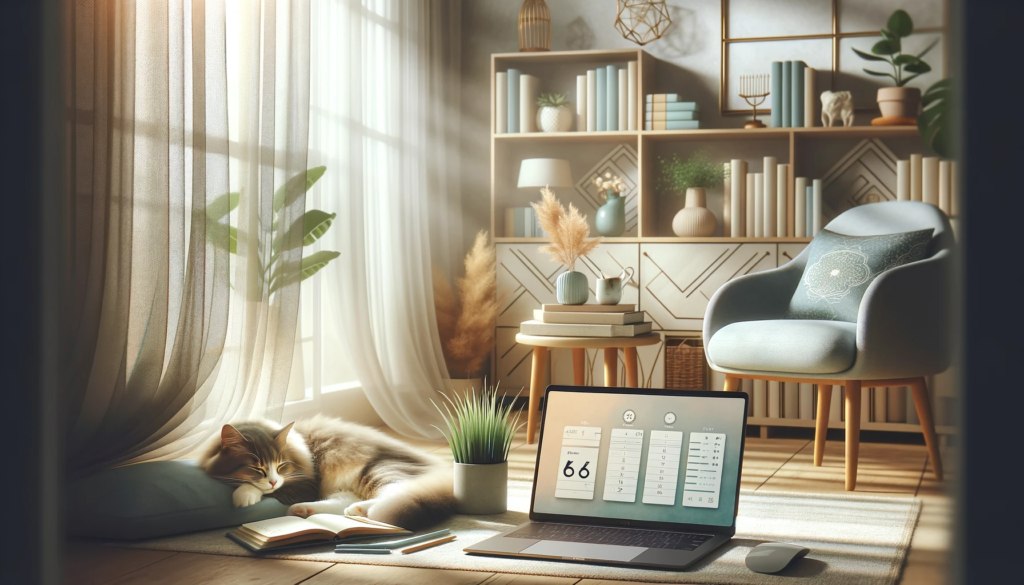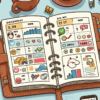In the ever-evolving digital age, managing our daily tasks efficiently has become paramount. The Notion Daily Planner stands out as an exceptional tool for organizing and enhancing productivity. This comprehensive guide delves into the multifaceted features of the Notion Daily Planner, offering insights on how to optimize your daily scheduling and task management.
What is the Notion Daily Planner?
The Notion Daily Planner is a versatile and powerful digital planning tool offered within the Notion workspace platform. Notion itself is a highly flexible and integrated workspace that combines elements like notes, tasks, wikis, and databases, providing users with a comprehensive environment for organizing and managing various aspects of their work and personal lives.

Specifically, the Notion Daily Planner is designed to help individuals and teams plan their daily activities with ease and efficiency. It bridges the gap between traditional paper planners and the dynamic capabilities of digital technology, offering a modern solution for daily organization and time management.
Key features and benefits of the Notion Daily Planner include:
- Digital Flexibility: Unlike physical planners, the Notion Daily Planner operates entirely in a digital environment. This means you can easily add, edit, and rearrange tasks and events, adapting your schedule as needed throughout the day.
- Customization: Notion allows you to tailor your daily planner to your specific needs. You can create templates and add tags, labels, and color-coded categories, making it easy to categorize and prioritize tasks and appointments.
- Integration: The Notion Daily Planner seamlessly integrates with other elements within the Notion ecosystem. You can link tasks to related notes or documents, create databases to track progress, and establish wikis or knowledge bases to provide context for your daily activities.
- Collaboration: For teams, Notion’s collaborative features make it an excellent choice. You can share your daily planner with team members, assign tasks, set deadlines, and collaborate on projects within the same platform.
- Cross-Platform Access: Notion is accessible across various devices and platforms, including web browsers, desktop applications, and mobile apps. This ensures you can access and update your daily planner from anywhere, keeping you organized on the go.
- Search and Organization: Notion’s robust search and organization features make it easy to find and review past plans, tasks, and notes. This helps users maintain a historical record of their activities and progress.
In essence, the Notion Daily Planner takes the concept of a traditional daily planner and elevates it by harnessing the capabilities of digital technology and seamless integration with other productivity tools. It empowers users to stay organized, prioritize tasks, and manage their time efficiently, making it a valuable asset for both personal and professional use.
Advanced Features of the Notion Daily Planner
Notion is a versatile note-taking and productivity tool that allows you to create custom daily planners and task management systems. While the basic features of Notion’s daily planner are straightforward, you can enhance its functionality by incorporating advanced features and customization options. Here are some advanced features you can use to create a more powerful Notion daily planner:
- Templates and databases:
- Create a database specifically for your daily planner. This allows you to add custom fields, views, and filters to organize your tasks and events.
- Utilize Notion’s built-in templates for daily, weekly, or monthly planning. Alternatively, create your own custom templates to suit your needs.
- Custom Properties:
- Add custom properties to your daily planner database. These properties can include due dates, priority levels, time estimates, and tags for categorizing tasks.
- Create formulas to calculate task completion percentages, due date alerts, or other dynamic data based on your task properties.
- Views:
- Use different views in your database to visualize your daily planner data in various ways. Notion offers options like table, calendar, board, gallery, and list views.
- Create filtered views to display tasks or events based on specific criteria, such as priority, due date, or status.
- Linked Databases:
- Link related databases together. For instance, you can link your daily planner to a project management database or a goal tracker to maintain a holistic view of your tasks and goals.
- Rollup Fields:
- Use rollup fields to aggregate data from linked databases. For example, you can calculate the total time required for all tasks linked to a specific project.
- Templates and Page Blocks:
- Embed various types of content within your daily planner, such as a calendar, a habit tracker, or a journal. Use Notion’s page blocks to include these elements on your daily pages.
- Integration with Other Apps:
- Integrate Notion with other apps and services using third-party tools like Zapier or Integromat. This enables you to automate tasks and import data from external sources.
- Reminders and Notifications:
- Set up reminders and notifications for important tasks and events. Notion allows you to create date-based reminders that can help you stay on track.
- Collaboration and Sharing:
- Collaborate with others by sharing your daily planner. You can assign tasks to team members, leave comments, and track changes made by collaborators.
- Advanced Filters and Sorting:
- Create complex filters and sorting options to view your tasks and events in a highly customized way. You can sort by multiple criteria and create intricate filter conditions.
- Use formulas and relations:
- Implement formulas to perform calculations within your planner, such as calculating the total time allocated for a day’s tasks.
- Use relational properties to connect tasks or events to related projects or goals.
- Custom Styling:
- Apply custom styling and formatting to your daily planner pages using Notion’s built-in styling tools. This can help you make your planner visually appealing and organized.
By incorporating these advanced features into your Notion daily planner, you can create a highly personalized and efficient tool to manage your tasks, goals, and daily activities. Experiment with these options to find the setup that works best for your workflow and productivity needs.

Tips for Maximizing Productivity with the Notion Daily Planner
Here are some additional tips for maximizing productivity with the Notion Daily Planner:
- Set Clear Priorities: When adding tasks to your Notion Daily Planner, prioritize them using labels, tags, or color-coding. This visual distinction helps you quickly identify and tackle high-priority items first.
- Time Blocking: Consider using time-blocking techniques within your Notion Daily Planner. Allocate specific time slots for tasks and activities to ensure you allocate your time effectively.
- Checklists and Sub-Tasks: Break down complex tasks into smaller, actionable sub-tasks or checklists. This approach makes tasks more manageable and provides a sense of accomplishment as you complete each subtask.
- Use Reminders: Take advantage of Notion’s reminder and notification features to stay on top of important deadlines and appointments. Set reminders for tasks and events to ensure you don’t forget them.
- Templates: Create templates for recurring tasks or projects. This saves time when setting up new daily plans, especially for routines or projects with similar structures.
- Data Visualization: Use Notion’s database and charting capabilities to visualize your progress and track key metrics. Charts and graphs can help you assess your productivity trends over time.
- Collaboration: If you’re working with a team, use Notion’s collaboration features to assign tasks, leave comments, and communicate with colleagues within the same planner. This promotes efficient teamwork and project management.
- Review and Reflect: In addition to daily reviews, schedule weekly or monthly reviews to assess your overall productivity, identify areas for improvement, and adjust your planner accordingly.
- Backup and Sync: Ensure your Notion data is regularly backed up and synced across devices. This safeguards your planner against data loss and allows you to access it from anywhere.
- Keyboard Shortcuts: Familiarize yourself with Notion’s keyboard shortcuts to navigate and edit your planner more efficiently. This can save you a significant amount of time in the long run.
- Offline Access: Use Notion’s offline access feature to continue working on your planner when you’re not connected to the internet. This ensures you can stay productive even in offline environments.
- Experiment and iterate: Don’t be afraid to experiment with different layouts and structures within your Notion Daily Planner. Over time, you’ll discover what works best for your unique workflow and preferences.
- Stay Organized: Maintain a well-organized workspace within Notion. Use folders or tags to categorize and group related tasks and projects, making it easy to locate information when needed.
By implementing these tips and making the most of Notion’s features, you can enhance your productivity and make the most of your Notion Daily Planner to manage your daily tasks effectively.
Why should you use Notion’s Daily Planner?
The Notion Daily Planner is more than just a scheduling tool; it’s a comprehensive solution for managing your daily life with efficiency and ease. Whether you’re looking to boost productivity, collaborate more effectively, or simply organize your day better, the Notion Daily Planner is an invaluable asset.
Explore more productivity tips and tools on aidailyplanner.com. Don’t forget to check out our other posts for more insights into maximizing your efficiency and organization.
Some questions that people usually ask about Notion Daily Planner App
Certainly, here are some common questions that people often ask about the Notion app, along with brief answers:
What is Notion?
Notion is an all-in-one productivity and note-taking app that allows you to create and organize various types of content, including notes, tasks, databases, and more.
Is Notion free to use?
Yes, Notion offers a free plan with basic features. However, there are also paid plans with additional features and storage options.
How do I get started with Notion?
You can sign up for a Notion account on their website or download the mobile app. After that, you can start creating pages and databases.
What are some use cases for?
Notion can be used for note-taking, task management, project planning, knowledge management, team collaboration, personal journaling, and more.
Can I access Notion offline?
Notion does have limited offline functionality, but it’s primarily an online app. You can access your documents offline, but you need an internet connection to sync changes.
How can I organize my information in Notion?
You can use pages, databases, and hierarchical structures like boards and tables to organize your information. Tags, filters, and views can also help in organizing and retrieving data.
Can I collaborate with others in Notion?
Yes, Notion supports real-time collaboration. You can invite others to collaborate on documents, and changes are synced in real-time.









Leave a reply